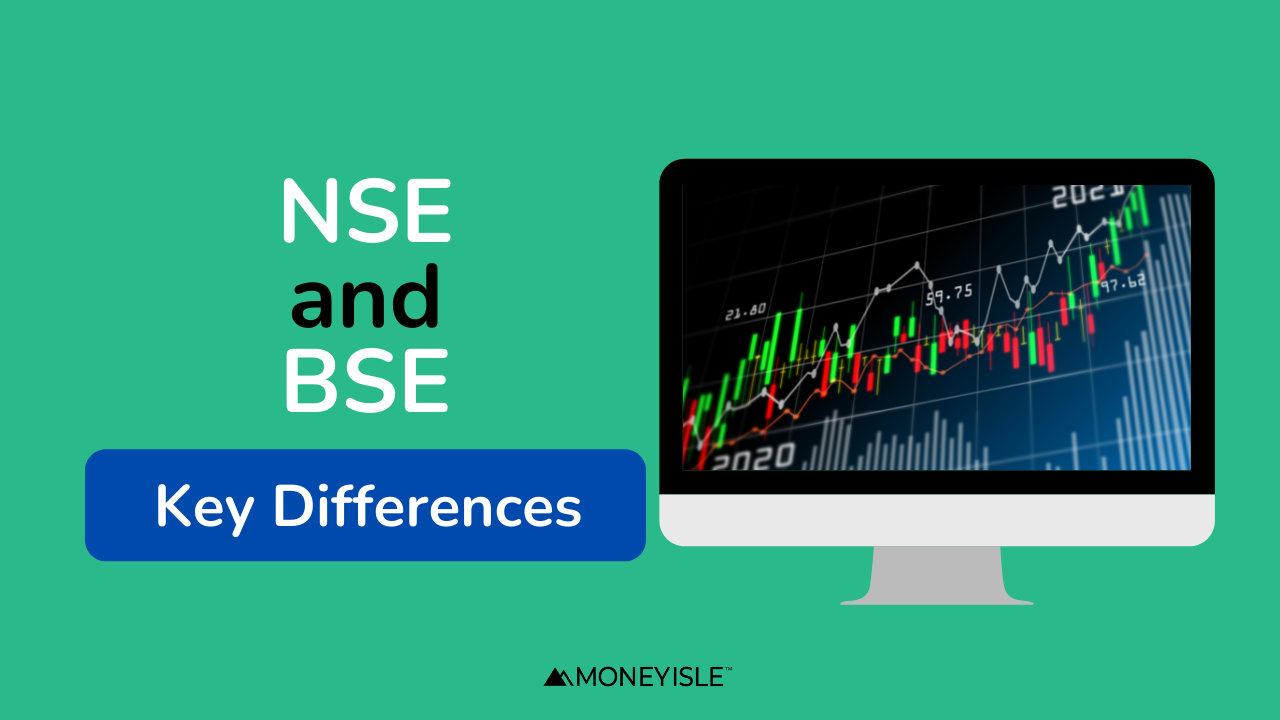If you have ever invested in the stock market, you’d have come across NSE and BSE.
It’s not the first time you are hearing these terms and yet you are still wondering what’s the difference between NSE and BSE in the first place.
Share markets have been running on an everyday basis since 1875. Being introduced to the two most important market exchanges are important before you start your investing journey.
Stock exchange – An overview
In stock exchanges, shared bonds are traded between traders frequently for raising money. As we know, the stock market is an organized and regulated space where investors are free to trade, buy and sell shares of their preferred corporations.
At the end of the day, the sole purpose of investing is making profits. This is done by monitoring the real-time market situation provided by the stock exchanges.
In this case, the presence of a stock exchange is important to build the economy as it’s the one particular place to trade with a wide variety of instruments.
That’s where our stock exchanges are differentiated and we can find the difference between BSE and NSE.
The Bombay Stock Exchange
Bombay Stock Exchange (or BSE) is the oldest stock exchange throughout Asia.
Created in the year 1875, the BSE has been offering some of the most efficient trading instruments that include:
- Equity
- Debt instruments
- Mutual Funds
- Currencies
- Derivatives
- Commodities
The Bombay Stock Exchange got recognized in the year 1957 as a premier stock exchange by the Central Government of India.
BSE was established and founded by Premchand Roychand. Called The Native Share during its inception, it was soon called the Bombay Stock Exchange.
The benchmark index of BSE is the Sensitive Index (or SENSEX) which is the first equity index in the country, tracking the top 30 leading companies listed under the BSE. These are the companies that reflect the economy of the country as a whole.
The National Stock Exchange
Founded in 1992, the National Stock Exchange (or NSE) is the youngest stock exchange of the country.
The NSE introduced some of the most advanced instruments to the trading environment, including:
- Automated,
- Screen-based,
- And online trading in India.
Since the year 1995, the NSE has been at the forefront of providing a secure trading experience for shares, derivatives, and bonds digitally.
Not only that, but we even witnessed the paper-based settlement system from NSE.
The benchmark index of NSE is the Nifty-50, which was introduced in 1996, and features the 50 most highly liquid, constant trading Indian companies.
The Nifty-50 gives a very clear picture of the stock market and the nationwide economic trends, practically equipping investors with some of the best investment opportunities.
What are the differences between NSE and BSE?
So far as we already know about the BSE and NSE from a rough perspective, let’s try to understand the differences between NSE and BSE a little better.
-
e-trading
As far as NSE vs BSE is concerned, the NSE is more oriented towards e-trading because of its arsenal of advanced trading instruments. Being a fully electronic stock exchange promoting a paperless trading system, NSE has been oriented towards e-trading right from its inception.
On the other hand, BSE is oriented more towards the paper-based system and is still used for the same purposes as well. The transition to the electronic trading system happened in 1995 with the introduction of BSE On-line Trading (BOLT).
-
Incorporation
Being the oldest stock exchange across Asia, BSE has been existing since the 19th century.
On the other hand, NSE entered the game in 1992.
As far as the global stock exchange rankings are concerned, the BSE stands at 10th position while the NSE stands at 11th position.
-
Derivatives contracts
NSE has a huge segment of derivatives contracts, as two of the NSE’s major indices (Nifty 50 and Bank Nifty) are known to be the most highly traded contracts in the derivative segments in India.
BSE, on the other hand, has lower volumes among investors as well as traders.
-
Listing of Stock Exchange
Among BSE vs NSE, the Bombay Stock Exchange is the only listed exchange in India. It has been listed on NSE as well.
Unfortunately for NSE, the same couldn’t be done because of a variety of legal problems.
-
Listed Companies
Because of the long existence of BSE among NSE vs BSE, the number of listed companies on the Bombay Stock Exchange is more than the National Stock Exchange.
The BSE has more than 5000 companies listed on the exchange, whereas the NSE has around 1600 companies.
| The difference | Bombay Stock Exchange (BSE) | National Stock Exchange (NSE) |
|---|---|---|
| Established in | 1875 | 1992-93 |
| Ranking | BSE holds the 10th position globally in being the biggest exchanges globally. | NSE is the world’s 11th leading and biggest stock exchanges. |
| Benchmark Index | The benchmark index of BSE is the Sensitive Index (or SENSEX) which is the first equity index in the country. | The benchmark index of NSE is the Nifty-50, which was introduced in 1996, and features the 50 most highly liquid, constant trading Indian companies. |
| Companies listed | The BSE has more than 5000 companies listed on the exchange | The NSE has more than 1600 companies listed on the exchange |
| Market Capitalization | BSE has a market capitalization of around $2.3 trillion. | NSE has a market capitalization of around $2.27 trillion. |
| Instruments introduced | The BSE has been offering some of the most efficient trading instruments that include equity, debt instruments, mutual funds, currencies, derivatives etc. | The NSE introduced some of the most advanced instruments to the trading environment including automated, screen-based payments and online trading in India. |
| Network (Trading throughout cities) | 419 cities | 1500 cities |
Conclusion
The National Stock Exchange and the Bombay Stock Exchange are individually significant for your investments.
The selection among either depends upon the companies listed. Investors can prefer investing wherever their needs require them to.
With more stocks listed as compared to NSE, BSE is definitely beginner-friendly. But at the same time, NSE provides high liquidity as compared to BSE.
If you are confused about which of these strategies to choose, you can connect with us at MoneyIsle and we will connect you with our experts to help you achieve your financial goals.











